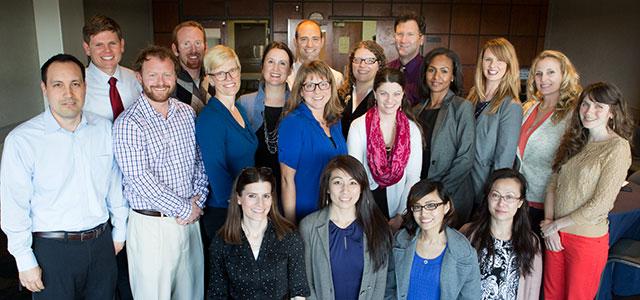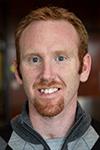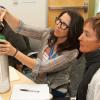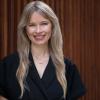
The inaugural cohort of the UC San Francisco Master of Science in Healthcare Administration and Interprofessional Leadership (MS-HAIL) program.
Diverse Interests Characterize First Cohort for Unique Low-Residency Master’s Program
On the weekend of March 21, 22 and 23 – after 10 weeks of online work and conversation – the inaugural cohort of the UC San Francisco Master of Science in Healthcare Administration and Interprofessional Leadership (MS-HAIL) program met for the first time in person for the first of two on-campus intensives that students must complete to earn their degree.
Faculty from the schools of medicine, nursing and pharmacy led a program called “Essential Leadership: Foundations for Effective Performance,” which provided students with an immersion experience focused on creativity, strategic agility and interprofessional collaboration.
At the end of the first day, Science of Caring spoke with a number of the students to understand why they are in the program and to get their impressions of the first 10 weeks.
Carlina Hansen
Executive director of the Women’s Community Clinic in San Francisco, California
 Carlina Hansen I’ve been at the Women’s Community Clinic for 14 years. I came from a general nonprofit background, having worked for several years at the Tides Center. I started at the clinic as a volunteer. About a year later, I was hired as the executive director; at the time there were two staff and 50 volunteers.
Carlina Hansen I’ve been at the Women’s Community Clinic for 14 years. I came from a general nonprofit background, having worked for several years at the Tides Center. I started at the clinic as a volunteer. About a year later, I was hired as the executive director; at the time there were two staff and 50 volunteers.
The world of community clinics has changed dramatically since their origins in the ’70s, and things continue to change. Our clinic has grown and changed dramatically too; we now have 30 staff. Increasingly, community clinics have to live by the same rules as everybody else in health care. In order to lead, you have to know about things you didn’t know about before, like the Triple Aim, medical homes, “lean,” managed care and ever-increasing regulatory requirements. It is essential that we have this context so that we are capable of better serving our clients and providing high-quality care.
I started out in health care having been rooted in social justice work and having a specific interest in health equity. When I started at the clinic, health care was new to me, and I have been learning ever since. More recently, I was ready to learn more and started looking into master’s in health care administration programs. I discovered the new UCSF MS-HAIL program while doing some online research. The clinic has a close relationship with the UCSF School of Nursing, and the program is perfect for me in that it allows me to keep working while pursuing my degree at an institution that has a demonstrated commitment to the health of underserved populations.
The interprofessional piece was particularly interesting to me, because we have a HRSA grant that is a partnership with the School of Nursing with a focus on interprofessional practice. So here I am – and couldn’t be more excited to be part of the first cohort of students. As a nonprovider in health care administration, I’m really interested in how providers intersect with administrators and how we lead collaboratively and effectively in this rapidly changing health care climate. This weekend’s MS-HAIL in-person session was really compelling. The diversity of professionals – HR, utilities, nursing, MDs – has given me new perspectives on my work and a richness of perspective to bring back to our clinic to be able to improve the health and well-being of our San Francisco community.
Jordan Franck
Senior analyst in the delivery systems strategy and business development department of Kaiser Permanente, Northern California
 Jordan Franck I’m focused on how we deliver services in our region: how we provide access and provide care that’s not too expensive and is the right care at the right time. So if we need to rebuild hospitals due to seismic issues – how big? what services? – I look at data, get business information and connect that with what clinicians tell me they need. Kaiser is a great place to learn about how to deliver care for a population, especially in a regional position.
Jordan Franck I’m focused on how we deliver services in our region: how we provide access and provide care that’s not too expensive and is the right care at the right time. So if we need to rebuild hospitals due to seismic issues – how big? what services? – I look at data, get business information and connect that with what clinicians tell me they need. Kaiser is a great place to learn about how to deliver care for a population, especially in a regional position.
I have an undergraduate degree in health care administration, but higher education has always been a goal. This was a good opportunity, because not only could I continue to work, but I can also become eligible for an administrative fellowship, at Kaiser or elsewhere.
I’m excited to take the skills I’ve gained from past operations experience, current strategy experience and this leadership education and combine them to become someone who can manage a service or department to really create change. The leadership component really drew me in, as well as the opportunity to learn about health care administration and finance and management skills and to connect it all with a research component, which a lot of master’s programs don’t have.… The thing I didn’t connect at the beginning is how important leadership is to make change that is effective. A lot of times we think of a leader as someone in power, but a real leader is someone who can work with others and guide them to success. I think that component is so complex but so necessary. Traditionally, leadership skills have been overlooked, and I think this program is trying to build that out. I’m really developing my skills as a thinker, so I can create change systematically during health care reform, instead of blindly trying to create it.
Ileita Lafitte
Registered nurse at Summit Hospital in Oakland, California; student in UCSF School of Nursing Advanced Practice Public Health Nursing program
 Ileita Lafitte My experience working as a superuser with my hospital’s EHR implementation sparked my interest in the administrative and technology side of health care. I discovered a niche for myself and saw an opportunity to develop myself as a liaison who can help improve the utilization of technology in health care. My personal goals include creating a better experience for nurses and other interprofessional staff. Ultimately, this preparation could lead to a clinical informaticist position.
Ileita Lafitte My experience working as a superuser with my hospital’s EHR implementation sparked my interest in the administrative and technology side of health care. I discovered a niche for myself and saw an opportunity to develop myself as a liaison who can help improve the utilization of technology in health care. My personal goals include creating a better experience for nurses and other interprofessional staff. Ultimately, this preparation could lead to a clinical informaticist position.
It’s really exciting meeting everyone face-to-face. I think it really enhances our learning. As one of the younger students in the cohort, I really enjoyed some of the exercises where we really opened up; hearing some of the professional and personal experiences of my classmates was really valuable and made me feel very connected to my cohort.
Both the interprofessional aspects of the program and the leadership piece were really important draws – in addition to the technology. These program features will support me in developing my leadership skills and style. I aspire to learn more about how to reach our collective goals, to improve the quality of care for the patients we serve. By coming together, I believe that we’ll reach our goals sooner and more efficiently; I’m really passionate about the interprofessional approach.
David Baker
Cardiologist and president of a group practice in Carson City, Nevada
 David Baker Long-term I started looking at myself doing more administrative and physician leadership-type roles and realized I had the clinical background but not the business background. I need to cement that part of my education – the leadership skills as well, but largely the business end of things.
David Baker Long-term I started looking at myself doing more administrative and physician leadership-type roles and realized I had the clinical background but not the business background. I need to cement that part of my education – the leadership skills as well, but largely the business end of things.
Today was great…fantastic. I’ve been impressed by not only the instructors and the education, but also the people in the room here who are students in this program. They’re a very successful, very diverse group, and understanding all of these different players is huge. I understand health care from the physician’s perspective, but to see all the different facets that go into health care has been great.
Stacy McLachlan
Perinatal educator and assistant clinical director at Kaiser Permanente in Los Angeles, California
 Stacy McLachlan I’ve always been in the health care field; I was a nurse, and my primary role now is clinical education for labor and delivery and postpartum nurses, but my position of assistant clinical director is the beginning of my leadership role.
Stacy McLachlan I’ve always been in the health care field; I was a nurse, and my primary role now is clinical education for labor and delivery and postpartum nurses, but my position of assistant clinical director is the beginning of my leadership role.
To be brutally honest, the prestige of having a master’s degree from UCSF was really enticing. I took a lot of time and effort to think about a graduate degree; I considered becoming a CNS, but as I’ve moved into leadership, I decided that is where my niche is. I live in LA and wasn’t willing to give up what I was doing, and then this opportunity presented itself, and it is exactly what I need. This is UCSF. It is the top nursing school, and it’s where I wanted to be.
Today was amazing, actually. Had we not had this opportunity to interact online, we wouldn’t have been as productive as we’ve been today – I don’t think any of us would have been able to walk into the room this morning and work and share the way we did. It’s an amazing program, and this has been great.
If I wanted to stay in the job I’m in now, I would have done clinical nursing, but I want to further health care. We’re in a crucial time right now, with health care changing dramatically, especially with the ACA, but the tools we need to make sure we’re hitting all of our aims haven’t been embedded in leadership until now. I want to springboard into a new role, and interprofessional leadership is essential, because we need all of the disciplines working together if we’re going to keep the patient at the center.
Helen Shui
Executive assistant to the director of the UCSF Helen Diller Family Comprehensive Cancer Center in San Francisco, California
 Helen Shui I’ve been at UCSF for almost 10 years. I started in the UCSF dermatology clinic, transitioned to pediatric dermatology, moved to the Office of Graduate Medical Education, became education manager for the Division of Hematology and Medical Oncology and worked in development on the School Programs and Alumni Relations team before coming back to the Cancer Center.
Helen Shui I’ve been at UCSF for almost 10 years. I started in the UCSF dermatology clinic, transitioned to pediatric dermatology, moved to the Office of Graduate Medical Education, became education manager for the Division of Hematology and Medical Oncology and worked in development on the School Programs and Alumni Relations team before coming back to the Cancer Center.
I’ve always been interested in medicine and even wanted to be a nurse for a brief moment. I had heard about the MS-HAIL program from my colleagues in development, and while working at UCSF’s Alumni Weekend, I met Mary Louise [Fleming]. We discussed the program, and the interprofessional piece piqued my interest. I think it’s great we can have such a mixed cohort. It’s so important that we understand how we all influence health care.
Today was fun. If we had done the on-campus piece first, our online exchanges might have been easier, but because we’ve been interacting online and have gotten to know a little about each other virtually, there was more open sharing during the activity where we shared who we were 10 years ago, who we are now and who we’ll be 10 years from now.
My interest is in health care diversity. We need more underrepresented minorities in medicine – in clinical leadership roles as CEOs, CMOs and CIOs, in biotech, research and in positions that create health care policy. With our changing population, it’s important that health care reflect the community it serves. The diversity office at UCSF is working at it and could be a great place to work. There’s such a need. We should prioritize diversity by providing more support to develop programs that help UCSF recruit more underrepresented minorities in health care.
Louis Ward
Director of support operations, Mayers Memorial Hospital District in Fall River Mills, California
 Louis Ward We’re in the far-northeastern corner of California; we’re a critical access hospital, a 25-bed facility, also a 100-bed skilled nursing facility. We’re small but feel bigger than we are. I oversee all of the support departments, and we’re the support structure for the physicians, the nursing group and ancillary services. By assisting them with the best tools, we provide the best support for the best possible care…so a big goal of mine is to support the staff I work with and lead.
Louis Ward We’re in the far-northeastern corner of California; we’re a critical access hospital, a 25-bed facility, also a 100-bed skilled nursing facility. We’re small but feel bigger than we are. I oversee all of the support departments, and we’re the support structure for the physicians, the nursing group and ancillary services. By assisting them with the best tools, we provide the best support for the best possible care…so a big goal of mine is to support the staff I work with and lead.
For the foreseeable future, this is about how can I best do my job: practicing, refining and continuing to grow. The MS HAIL program at UCSF was the right decision for me at this point in my career because of the flexibility the program allows for working professionals. The program promotes leadership as a continued practice, one that allows for constant consideration of how I can best do my job as a leader in a health care organization. You begin to learn more about yourself through leadership courses, how you work with other individuals – and most importantly, the practical application of an evolving leadership style. Throughout the program a large emphasis is placed on biomedical informatics and how patient care is changing because of this. When I saw that, I knew this was the right program for me, because they’re on the cutting edge of care; they’re looking into the future instead of concentrating on the past.
Sherry Corcoran
Operations and finance manager for urologic and endocrine oncology at the UCSF Helen Diller Family Comprehensive Cancer Center in San Francisco, California
 Sherry Corcoran I got an MBA a few years back, and I have a good understanding of finance on the corporate side, but when I took this job in health care, I found it was very different. One of the biggest differences is we bill out in health care, but the amount we collect is totally different, and that’s a big change. I’m seeing finance on the front lines, but I don’t feel like I have a good concept of finance across all of health care. I actually looked at a couple of different programs – contacted some people here about classes to audit – but then someone forwarded this to me.… I’m using the second half of my GI Bill – I was a Marine – to cover the whole program. I worked with some folks here setting that up, and they’ve been super helpful.
Sherry Corcoran I got an MBA a few years back, and I have a good understanding of finance on the corporate side, but when I took this job in health care, I found it was very different. One of the biggest differences is we bill out in health care, but the amount we collect is totally different, and that’s a big change. I’m seeing finance on the front lines, but I don’t feel like I have a good concept of finance across all of health care. I actually looked at a couple of different programs – contacted some people here about classes to audit – but then someone forwarded this to me.… I’m using the second half of my GI Bill – I was a Marine – to cover the whole program. I worked with some folks here setting that up, and they’ve been super helpful.
The day’s been fantastic. Seeing people online, it’s hard to remember who is who – you don’t get a sense of the person. Seeing people in person…you see a personality.
I have a staff of maybe 35, if you add them all up, and I really like my job and I want to do it better; I want some of the people I supervise to have it better. Already, after some of the classes, I’ve thought: I wish I knew this a year ago. I hope this program makes me a better leader.
Van Nguyen
Finance manager at COPE Health Solutions, a leading health care consulting corporation based in Los Angeles, California
 Van Nguyen Health care is a sensitive business that provides human services as its main product. I have a strong passion for human services and a natural interest in business.
Van Nguyen Health care is a sensitive business that provides human services as its main product. I have a strong passion for human services and a natural interest in business.
To accomplish my goal of becoming a COO or CFO of a health care organization, the three key qualifications needed are in-depth understanding about health care policy and management, strong leadership and interprofessional skills and advanced business and financial knowledge. These qualifications form a triangle of success. The UCSF MS-HAIL program is a perfect choice, as it will help me hit the first two vertices of the triangle.… The program provides not only theories but also practical knowledge. I find myself applying lots of course materials to critical thinking and decisionmaking at work.… The evidence-based capstone project will be a valuable learning experience as it provides an opportunity to apply academic theories to real-life situations.
The on-campus weekend was incredibly informative. Before the weekend, I always thought about what I could do to make changes in health care. During the drive back to LA, I asked myself what I could do to effectively collaborate with my fellow health professionals to make changes for the better in health care. My most significant takeaway is health care is not about one leader lonely on the top; it’s about sharing leadership.
Ellen Kynoch
Interim patient care manager on a medical-surgical, high-acuity step-down unit at UCSF Medical Center in San Francisco, California
 Ellen Kynoch I’ve been a nurse for 15 years, and nursing is funny; if you’re a really good nurse…and you have any intrinsic leadership abilities, you get put into these leadership roles, without formal training. I’m a natural leader, and I like doing administrative work, but I need a stronger foundation in how to lead people so things work better, how to mentor our staff and how to help develop and align with the vision of the organization. I’m looking to be a better servant to people at the hospital, so I’m kind of backfilling my knowledge.
Ellen Kynoch I’ve been a nurse for 15 years, and nursing is funny; if you’re a really good nurse…and you have any intrinsic leadership abilities, you get put into these leadership roles, without formal training. I’m a natural leader, and I like doing administrative work, but I need a stronger foundation in how to lead people so things work better, how to mentor our staff and how to help develop and align with the vision of the organization. I’m looking to be a better servant to people at the hospital, so I’m kind of backfilling my knowledge.
Today was really great; I can’t tell you how much I looked forward to meeting people in person. Our cohort is fabulous, such a high caliber of people; we’re learning so much from each other. They say online there’s not a lot of intonation, but we all found a way to identify ourselves and show our unique talents, and today kind of validated what we found about each other online.
I haven’t been in school since 1999, and I wasn’t the strongest student – and here I am at one of the best schools in the country, and I’m just so honored to be part of this program. I don’t know, maybe they took a chance on me, but I do think I have a lot to offer in health care. And I’m really excited to develop and be part of this greater team. These last three months, my eyes have been opened. I’ve been fulfilled so much professionally and academically; I can only imagine what the next three months will bring.



